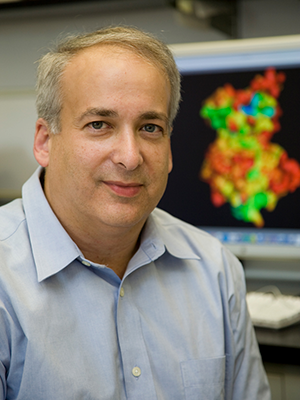
Todd C. Sacktor, MD
Distinguished Professor
Physiology and Pharmacology
Anesthesiology, Neurology
Dr. Sacktor received an A.B. from Harvard College in 1978, and an M.D. from the Albert Einstein College of Medicine in 1982.
During and after a residency in neurology at Columbia Presbyterian Medical Center, Dr. Sacktor studied the role of protein kinase C (PKC) in short-term memory in the model system Aplysia californica, under the tutelage of Dr. James H. Schwartz, at the Center for Neurobiology and Behavior, directed by Dr. Eric R. Kandel.
In his own laboratory at SUNY Downstate Medical Center, he discovered a brain-specific PKC isoform, PKMzeta. Together with colleagues, his lab demonstrated that PKMzeta was both necessary and sufficient for maintaining long-term potentiation and storing the long-term memory trace. These discoveries led to methods by which long-term memories can be erased or enhanced.
Recently, his laboratory revealed that PKMzeta continually interacts with a postsynaptic scaffolding protein, KIBRA, to maintain long-term memory. He has published in Science, Science Advances, Nature Neuroscience, eLife, and Proceedings of the National Academy of Science.
Education
- Undergraduate: Harvard College
- Medical School: Albert Einstein College of Medicine
- Internship: Montefiore Hospital
- Residency: Columbia University (Neurology)
- Fellowship: Howard Hughes Medical Institute (Columbia)
Research
Protein Kinase C Isozymes in Long-term Hippocampal Synaptic Plasticity and Memory Persistence
PKMζ, a unique, constitutively active isoform of protein kinase C (PKC), is the first identified component of the core mechanism of long-term memory storage.
How the brain stores long-term memory is a fundamental question in biology, with important clinical implications for neurology and psychiatry. Long-term increases in the strength of the synaptic connections between different networks of neurons are thought to be the physiological mechanism underlying memory storage. We have discovered the first molecular mechanism that maintains synaptic enhancement between these networks. This discovery was based upon experiments on the most widely studied form of synaptic plasticity in the brain, termed long-term potentiation (LTP). Although triggering LTP is very complex, the mechanism for maintaining LTP is relatively simple, involving a unique, persistently active kinase, called protein kinase Mzeta (PKMζ), a form of PKC discovered in the Sacktor lab. With Dr. Andre Fenton at Downstate, we were recently able to show that this mechanism not only maintains LTP, but underlies the persistence of long-term memory in the brain. As published in Science, inhibiting PKMζ with a drug caused the erasure of memories that had been learned a day, or even a month before. PKMζ inhibition did not damage the brain and, after the drug had been eliminated, new long-term memories could be learned and recalled. Thus PKMζ is the first functionally important memory storage molecule. In addition, work with Dr. Sue Mirra, Chair of Pathology at Downstate, showed that PKMζ is sequestered in the neurofibrillary tangles found in the brains of patients with Alzheimer's Disease. These results may be important toward understanding the memory loss that is the primary symptom of that disorder. As published in a second paper in Science, PKMζ has also been found to maintain long-term memories in the neocortex, the final repository for many types of memory. Therefore, PKMζ appears to be a general mechanism for long-term memory storage in the brain. The work on PKMζ and memory was recently highlighted as one of the ten “Breakthroughs of the Year 2006” by the editors of Science.
PersonnelPanayiotis Tsokas, Ph.D., Research Assistant Professor
Changchi, Hsieh, Ph.D., Research Assistant Professor
Andrew Tcherepanov, M.S., Technician
Service FunctionsGrant reviewer for the NIH Learning and Memory Study Section, the Hartford Foundation,
and Veterans Affairs.
Reviewer for various scientific journals.
Research Interests:
molecular mechanisms of memory; Alzheimer's disease
- Sacktor, T. C., Olsten, P., Valsamis, H., Jiang, X., Naik, M., and Sublette, E. (1993). Persistent activation of the ζ isoform of protein kinase C in the maintenance of long–term potentiation. Proc. Natl. Acad. Sci. USA 90, 8342-8346.
- Hrabetova, S., Serrano, P., Blace, N., Tse, H. W., Skifter, D. A., Jane, D. E., Monaghan, D. T., and Sacktor, T. C. (2000). Distinct NMDA receptor subpopulations contribute to the induction of LTP and LTD. J. Neurosci. 20, RC81.
- Naik, M. U., Benedik, E., Hernandez, I., Hrabe, J., Osman, M.,Valsamis, M., Dow-Edwards, D., and Sacktor, T. C. (2000). Distribution of protein kinase MɃ and the complete protein kinase C isozyme family in rat brain. J. Comp. Neurol. 426, 243-258.
- Drier, E. A., Tello, M. K., Cowan, M., Wu, P., Blace, N., Sacktor, T. C., and Yin, J. C. (2002). Memory enhancement and formation by atypical PKM activity in Drosophila melanogaster. Nat. Neurosci. 5, 316-324.
- Ling, D. S., Benardo, L. S., Serrano, P. A., Blace, N., Kelly, M. T., Crary, J. F., and Sacktor, T. C. (2002). Protein kinase Mζ is necessary and sufficient for LTP maintenance. Nat. Neurosci. 5, 295-296.
- Hernandez, A. I., Blace, N., Crary, J. F., Serrano, P.A., Leitges, M., Libien, J. M., Weinstein, G., Tcherapanov, A., and Sacktor, T. C. (2003). Protein kinase Mζ synthesis from a brain mRNA encoding an independent protein kinase Cζ catalytic domain. Implications for the molecular mechanism of memory. J. Biol. Chem. 278, 40305-40316.
- Muslimov, I. A., Nimmrich, V., Hernandez, A. I., Tcherepanov, A., Sacktor, T. C., and Tiedge, H. (2004). Dendritic transport and localization of protein kinase Mζ mRNA: Implications for molecular memory consolidation. J. Biol. Chem. 279, 52613–52622.
- Pastalkova, E., Serrano, P., Pinkhasova, D., Wallace, E., Fenton, A. A., and Sacktor, T. C. (2006). Storage of spatial information by the maintenance mechanism of LTP. Science 313, 1141-1144.
- Kelly M. T., Crary J. F., and Sacktor T. C. (2007). Regulation of protein kinase Mζ synthesis by multiple kinases in long-term potentiation. J. Neurosci. 27, 3439-3444.Shema, R., Sacktor T. C., and Dudai Y. (2007). Rapid erasure of long-term memory associations in the cortex by an inhibitor of PKMζ. Science 317, 951-953.
- Sacktor, T. C., and Hell, J. W. (2017). Sci. Signal. 10, eaao2327.